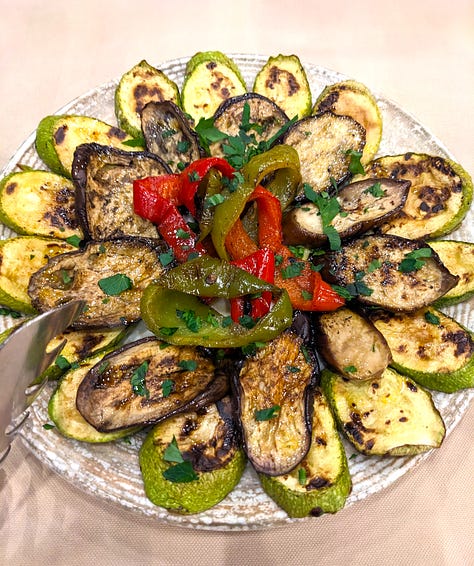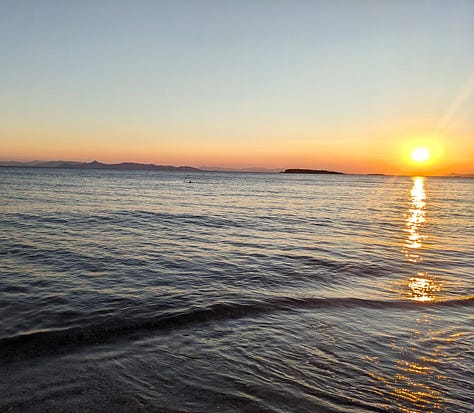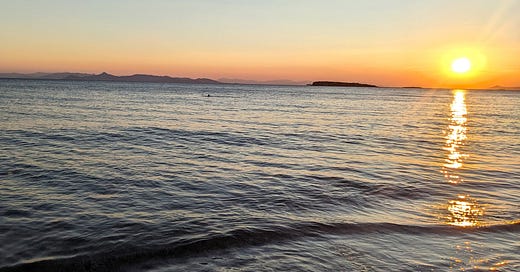This fills me with more fear than it should, but following feedback from some of my paid subscribers (thank you, always!!) that they sometimes struggle to get through lengthy posts, I am trialling a voiceover option for this issue.
It may be a one-off, or become a more regular thing, or just a special feature for paid subscribers, depending on the reception of this issue. And on my ability to stop tripping over myself at the thought of you listening to, rather than reading, my words.
You can of course feel free to ignore the little play button above, and read on at your leisure …
Hello! It’s been a while since I’ve written one of these, not since the elections issue in fact - still pertinent as we await for what November may bring.
The last two Cultural Compass issues have kindly been guest authored by
, sharing her work on self-awareness, and , with inspiring reads and listens for your coffee break, especially if you’re looking for a little something extra from life.It’s a joy to be back though, and I am very ready to jump in with a topic I’ve long been interested in, inspired by even, recently rocked by some new research…
📑 Fake News?
It started with a press release I saw come out of UCL last month, announcing that Dr Saul Justin Newman had won an Ig Nobel Prize for research that debunks the concept of Blue Zones.
Immediately I was filled with questions.
What is an “Ig” Nobel Prize?
Who is this Dr Newman?
How and why is he tackling this notion of longevity that I have come to know and aspire to?
For the unfamiliar, Blue Zones are pockets of the world where inhabitants have an increased chance of living to the age of 100 and beyond, with parallels drawn between the lifestyles in these areas, to form a sort of guide on how we might increase our own chances of such a long and rich life, regardless of where we live.
The recommendations to follow will dive more into where and what these are - because I still think there is value to be found in learning from and embracing them - but I felt it was important to acknowledge upfront the latest findings from Dr Newman, a Senior Research Fellow currently focused on sociogenomics and machine learning, that suggest it might all be a load of rubbish.
Though not yet peer-reviewed, through the investigative use of extensive government data and surveys, the findings suggest that in these regions demonstrating exceptional longevity and healthy lifestyles, what’s actually going on is a lot of pension fraud and a reliance on data with a lack of independence, pieced together to tell a story that doesn’t really exist.
While the prize is awarded to scientific research that “makes people laugh, then think”, this for me felt like no laughing matter. I felt - still feel - sorely disappointed. All the time I have spent reading about the habits of Blue-Zoners, dreaming about one day maybe living in one, for what?
When asked in a recent interview for The Conversation, what all this means for human longevity, Dr Newman suggests that, really, at this point, “we just do not know.” More research is needed, with more rigorous methods to be established, and more serious thinking about how our understanding about longevity influences decision making around policy and funding. An acknowledgement that this stuff matters; it’s not just about letting people dream of fanciful days eating figs fresh from the tree.
He also suggests that “longevity is very likely tied to wealth. Rich people do lots of exercise, have low stress and eat well.” Personally I find this a bit reductive, but it does hark back to the fundamental point that movement and how we eat are intrinsically linked to how long, and how well, we live.
There are some big proponents of the Blue Zones concept, not least Dan Buettner, founder of the Blue Zones LLC marketing company, but so far I haven’t seen any direct responses or challenges to this research. Maybe that means something, maybe it means nothing.
I think what all parties are interested in here, myself included, is what it really means to live a good, long life.
Even if the research isn’t totally up to scratch, I still think the concept of the Blue Zones, and lifestyle factors associated with them, can offer us something.
So let’s take a closer look.
🎧 Feeling Better
I can’t actually remember when or how I first learned about Blue Zones, but I wouldn’t be surprised if this episode of Dr Rangan Chatterjee’s Feel Better Live More podcast had something to do with it. I’ve fallen out of a regular habit of listening to his helpfully health-focused conversations with all manner of experts, but generally enjoy Dr Chatterjee’s commitment to long form conversations that can really get into the weeds of a topic.
In this conversation with Dan Buettner, they discuss the five official Zones, namely:
In each region, people are generally known to live a high quality of life into old age, and through interviews and other research conducted by Buettner and National Geographic colleagues, a shared set of lifestyle habits emerged (supposedly!) contributing to this.
Referred to as the “Power 9”, these habits include moving naturally, rather than spending an hour in the gym and the rest of the day on the sofa, embedded routines to downshift stress, whether than be meditation or happy hour, and eating more plant-based than meat-focused diets.
Investing time in loved ones, enjoying a little tipple with dinner, and having a reason to get out of bed in the mornings, all factor in too.
Now, I don’t know about you, but even if that routine doesn’t get me to 100, it doesn’t seem like a bad way to have lived.
If you’re interested in more of the foodie side of this lifestyle, have a listen to the wonderful
chatting recipes with Buettner for The Food Programme podcast.


📺 On the Silver Screen
Perhaps the most now famous on-screen showcase of the Blue Zones is the Netflix series Live to 100: Secrets of the Blue Zones. I haven’t watched it (terrible as I am at keeping up with new TV releases) so can’t necessarily recommend, but the trailer offers some nice cinematography and plenty of smiley, lovingly wrinkled faces, that suggests it’d probably be a nice watch.
The ideas have also been explored elsewhere though, including by Jon Snow for Channel 4, and by one-time millennial heartthrob (maybe he still is? though the ship has sailed for me…) Zac Efron, in his Netflix series, Down to Earth, co-hosted with Darin Olien.
The latter was one of my pandemic watches, enjoying the blend of travel and wellbeing at a time when both were precarious to say the least. But the episode featuring the Blue Zone of Sardinia in particular stood out for me, and I’ve often recounted anecdotes from that episode to friends, family and colleagues - basically anyone who will listen.
There was Efron being almost dumbfounded by the idea of being able to wholeheartedly enjoy pasta (i.e. carbs) and not always focus on protein-heavy meals, as he had long been instructed to by Hollywood trainers and nutritionists.
There was several generations cooking together in one kitchen, and sitting around the table to enjoy their meal together.
An ageing gent who goes for a walk around the village every day, popping into his local bar for a glass of wine. Just because. Not in celebration, or desolation. Just because why not. It’s a nice thing to do, no?
I think what also came through, as it does often with these ideas of living the good life, is the pace of life. The slowness of it, in contrast to my own. Yes, people have things to do. They, we, always will. But they don’t have to be done in one mad rush all the time. Constantly chasing time for more of itself. Ironically, that may lessen the amount of it we do have.
So whether you engage further with Newman’s research or Buettner’s, stay committed to the Mediterranean diet, including that nice Chianti, or your 6am HIIT workouts, perhaps just have a think about what you intuitively feel will keep you going, better, for longer.
As we continue to learn how to navigate this thing called life, we might as well make it a lengthy one.
If you enjoyed reading and/or listening to this piece, and would like to show some support without a paid subscription, a Ko-fi coffee is always much appreciated.☕





Thank you for the highlight and mention, as always 😊🙏🏻
Loved this Lauren ❤️ Nice hearing your voice too, now you're doing more audio👍The oldest people I've ever met were a sweet old couple, around 98 years old... in a poor countryside village in Vietnam, where it immediately struck me how bright and happy they all were! 😃
Living in huts with hardly any belongings and crouching over a fire to cook, the couple were still full of life, beaming with joy and still very able and with it. 😊
I really do believe the key to a long life is a calm and gentle pace, contentment and joy. Something this inspiring couple had in abundance. I will never forget the nearly-toothless grins from that day, filled with such joy and contentment, in a random village deep in the Vietnamese countryside 🧡